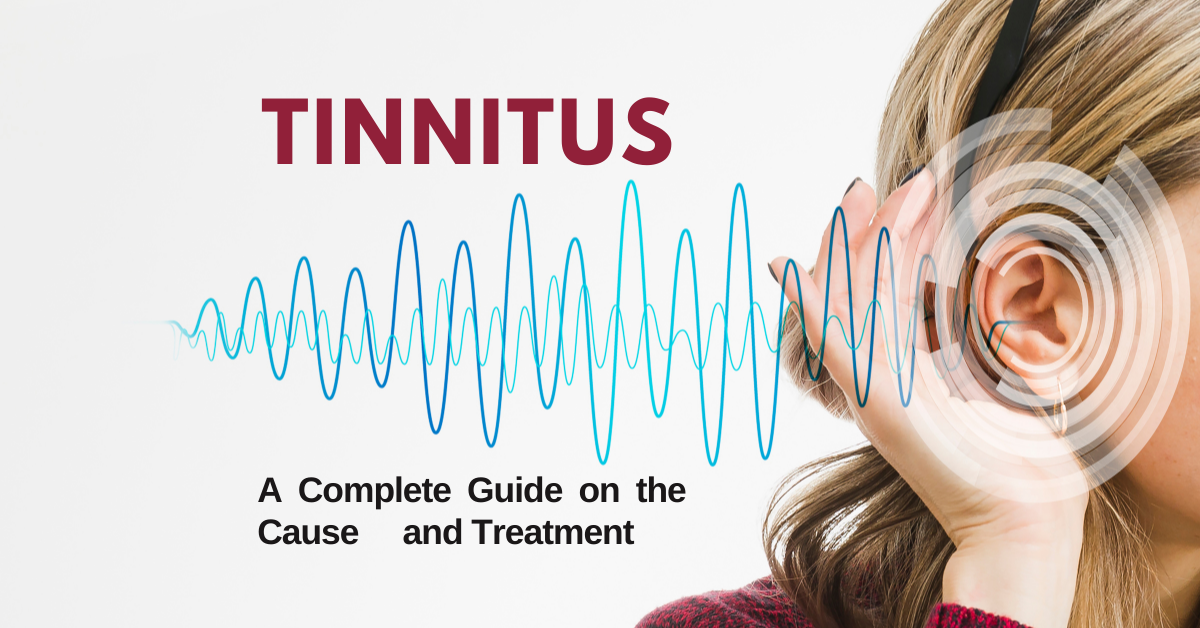Tinnitus refers to one of the most common hearing impairments that prevails worldwide. According to Forbes, tinnitus afflicted around 75% of the global population at least once in their lives. Although it is preventable, understanding the symptoms and when to approach audiologists or hearing aid clinics is essential. In the following blog, we will provide you with an end-to-end overview of this hearing impairment, its types, symptoms, causes, and treatments so that you get the right help on time for healthy living.
What is Tinnitus?
Tinnitus refers to an auditory impairment where a person perceives a sound that does not come from external factors. The word originates from the Latin “tinnire” which means “to ring”. Most tinnitus-affected individuals perceive a ringing in their ears, but many also hear a buzz or roar.
This hearing impairment affects both adults and children. Although one can address it with the right treatment and medication, if this impairment lasts for more than 3 months audiologists consider it as chronic. Therefore, once you start facing the symptoms as mentioned in the following, you must consider consulting a reputed audiologist or hearing aid clinic.
What are the Symptoms of Tinnitus?
The symptoms of tinnitus widely differ from one person to another. However, the most common indication of this hearing impairment include:
- Constant or irregular sound
- Hear ringing, buzzing, humming, or other noises in the ears
- Headache or pain in the ears in some cases
- Variation in sound intensity or frequency
- Sleep disturbances
- Anxiety or emotional distress
- Sensitivity to noise
What are the Different Types of Tinnitus?
Tinnitus comes in four different types including:
- Subjective tinnitus: It refers to the most common type that results from a disorder in an auditory nerve or the inner ear.
- Objective tinnitus: It refers to the auditory impairment where a person hears the sound of his/her muscle contraction or pulse. Jaw muscle movement, blood flow in the face/neck, muscle spasms around the middle ear, myoclonus twitching, and other vascular conditions can cause these sounds.
- Pediatric tinnitus: It refers to hearing impairment due to vascular anomalies affecting ear structures. It commonly affects children.
- Pulsatile tinnitus: Pulsatile or vascular tinnitus refers to the auditory impairment where an individual hears a sound synchronized with their pulse. Atherosclerosis, altered blood flow, or venous hum can cause this hearing impairment.
What is Tinnitus Caused By?
The primary causes of this hearing impairment include:
- Abnormal bone growth in the ear (otosclerosis)
- Age-related hearing issues
- Blood vessel disorder
- Consumption of antibiotics, antidepressants, NSAIDs (non-steroidal anti-inflammatory drugs) and other medicated drugs
- Earwax blockages or ear infections
- Eustachian tube dysfunction
- Exposure to loud noises or noise induced hearing loss
- Injuries to the brain or ear
- Lupus, rheumatoid arthritis, or other auto-immune diseases.
- Ménière’s disease
- Non-cancerous tumor on the vestibular nerve known as vestibular schwannoma
- Temporomandibular joint (TMJ) disorders, and more
How is Tinnitus Diagnosed?
Although audiologists detect it from the symptoms themselves, they perform physical examinations to understand the cause of this impairment. This helps them in following the right treatment method to address tinnitus. Some of these examinations include:
- Audiological (hearing) examination: In a hearing examination, audiologists ask you to sit in a soundproof room and wear specific headphones. These headphones transmit specific sounds into each ear one by one. Based on your auditory perception and comparison with specific parameters, doctors identify the cause of the tinnitus.
- Blood tests: Audiologists also recommend performing blood examinations to check for anemia, cardiovascular (heart) diseases, thyroid, and other health problems that could have triggered this hearing impairment.
- Imaging tests: Audiologists may recommend undergoing CT or MRI scans to confirm the cause of this hearing impairment.
- Movement examination: In this type of examination, audiologists ask you to move your arms, eyes, jaws, and neck. Based on the discomfort you experience in your ears during a particular movement, doctors identify the disorder that needs addressing.
How to Address Tinnitus?
Audiologists prescribe the following treatment to address this issue.
- Removing earwax: If earwax caused this hearing impairment, then audiologists will suggest removing earwax medically.
- Treating blood vessels in the ear: A poor blood vessel condition may trigger this hearing impairment. In such cases, doctors may recommend medication or surgery to treat the condition for addressing tinnitus.
- Hearing aids: Doctors will suggest hearing aids if you get tinnitus due to age-related or noise induced hearing loss. These devices amplify noises to improve auditory perception and reduce tinnitus symptoms.
- Administering in-ear noise generators: In-ear noise generators transmit white noise that provides relief to tinnitus. Doctors recommend these devices to individuals (especially elders) with incurable tinnitus.
- Counseling: Audiologists may also recommend Cognitive Behavioral Therapy (CBT), Tinnitus Retraining Therapy (TRT), or other counseling forms to change the way you perceive this hearing impairment and reduce its effect over time.
When Should You Consult an Audiologist?
Although many individuals do not bother with this hearing impairment, you may consider consulting an audiologist if you:
- Perceive ringing or other sounds in your ear for more than a week.
- Experience dizziness or hearing loss due to this impairment.
- Develop anxiety or depression due to this hearing impairment.
- Start facing vertigo after this impairment affects you.
Conclusion
In conclusion, tinnitus is a widespread hearing impairment, affecting a significant portion of the global population. Understanding its symptoms, types, causes, and treatments is crucial for timely action and prevention of long-term consequences. Seeking help from audiologists and hearing aid clinics can help in effective management and improved quality of life.

